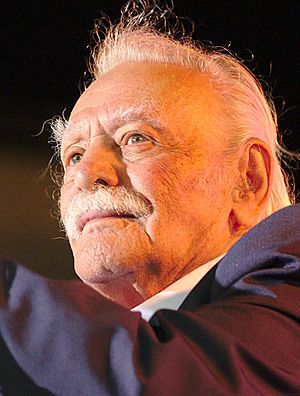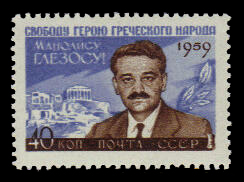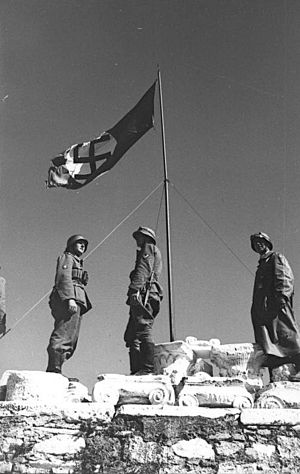Manolis Glezos facts for kids
Quick facts for kids
Manolis Glezos
|
|
|---|---|
|
Μανώλης Γλέζος
|
|

Manolis Glezos giving a speech in Omonoia Square, Athens in 2015.
|
|
| Member of the European Parliament for Greece |
|
| In office 1 July 2014 – 8 July 2015 (resigned) |
|
| Succeeded by | Nikolaos Chountis |
| In office 24 July 1984 – 25 January 1985 (resigned) |
|
| Succeeded by | Spiridon Kolokotronis |
| Personal details | |
| Born | 9 September 1922 Apiranthos, Naxos, Kingdom of Greece |
| Died | 30 March 2020 (aged 97) Athens, Greece |
| Political party | Popular Unity (2015–2020) Syriza (2012–2015) Synaspismos (1991–2012) PASOK (1981–1989) United Democratic Left (1974–1981) Communist Party of Greece (–1968) |
Manolis Glezos (Greek: Μανώλης Γλέζος; born September 9, 1922 – died March 30, 2020) was a famous Greek politician, journalist, and writer. Many people saw him as a hero. He is best known for his brave actions during World War II as part of the Greek Resistance, a group that fought against the occupation of their country.
In Greece, he is most famous for a very brave act. On May 30, 1941, he and his friend Lakis Santas climbed the Acropolis and took down the Nazi flag. This flag had been put there when Nazi Germany took control of Greece during the war. This act inspired many people to resist the occupation.
After the war, because of his political views, he was arrested and imprisoned many times. His struggles gained international attention. He was finally released for good in 1971. After Greece became a democracy again in 1974, Glezos continued his political work. He became a Member of the Greek Parliament for different parties. In 2014, at 91 years old, he became a Member of the European Parliament for the second time. This made him the oldest person ever elected to the European Parliament. He also received the most votes in Greece.
Glezos was an award-winning journalist. He worked as an editor for popular newspapers like Rizospastis and I Avgi. He also wrote and published six books.
Contents
Early Life and World War II Heroism
Growing Up in Greece
Manolis Glezos was born in the village of Apiranthos on the island of Naxos. In 1935, his family moved to Athens, where he finished high school. While in high school, he also worked at a pharmacy. In 1940, he was accepted into the Higher School of Economic and Commercial Studies, which is now known as the Athens University of Economics and Business.
Even as a high school student in 1939, Glezos was active in politics. He joined a group that was against fascism. This group opposed Italy's control of the Dodecanese islands and the dictatorship of Ioannis Metaxas in Greece.
Fighting for Freedom in World War II
When World War II began, Glezos wanted to join the Greek army. He volunteered to fight against Italy in Albania, but he was too young to join. Instead, he volunteered to work for the Greek Ministry of Economics. During the Axis occupation of Greece, he worked for the Greek Red Cross and the city of Athens. At the same time, he was very involved in the Greek Resistance.
On May 30, 1941, Manolis Glezos and his friend Apostolos Santas climbed the Acropolis. They bravely tore down the swastika flag that the Nazi forces had put there on April 27, 1941, when they entered Athens. This act of defiance inspired not only Greeks but also people in other occupied countries to resist. It made Glezos and Santas known as international anti-Nazi heroes.
Hours later, the Nazi leaders sentenced the people who did this to death. However, Glezos and Santas were not identified until much later. Glezos was arrested by the German forces on March 24, 1942. He was imprisoned and tortured, which caused him to develop tuberculosis.
Glezos was arrested again on April 21, 1943, this time by Italian forces, and spent three months in jail. In 1944, he was imprisoned by Greek groups who worked with the occupiers. He was beaten for trying to escape.
Political Career and Activism
Post-War Struggles and Imprisonment
The end of World War II did not bring an end to Glezos's troubles. On March 3, 1948, during the Greek Civil War, he was put on trial for his political beliefs. He was sentenced to death multiple times by the Greek government. In 1950, his death sentences were changed to a life sentence in prison.
Even while in prison, Manolis Glezos was elected as a member of the Greek Parliament in 1951. He ran with the United Democratic Left party, also known as EDA. After being elected, he started a hunger strike. He demanded the release of other EDA members of parliament who were in prison or exiled. He ended his strike when seven of them were released. Glezos himself was released from prison on July 16, 1954.

On December 5, 1958, he was arrested again. He was accused of espionage, which was a common excuse to persecute left-wing supporters during the Cold War. His release on December 15, 1962, happened because of strong public protests both in Greece and around the world. He even won the Lenin Peace Prize during this time. While he was in prison for this second time, Glezos was re-elected as a Member of Parliament with EDA in 1961.
When a military coup d'état happened on April 21, 1967, Glezos was arrested early in the morning. He was imprisoned and exiled until his release in 1971. In total, Manolis Glezos spent 11 years and 4 months in prison and 4 years and 6 months in exile because of his political actions.
Return to Democracy and Later Political Life
After democracy was restored in Greece in 1974, Glezos helped to bring back the EDA party. In the elections of 1981 and 1985, he was elected as a member of the Greek Parliament with the Panhellenic Socialist Movement (PASOK) party. In 1984, he was elected as a Member of the European Parliament, also with PASOK. He served as the President of EDA from 1985 to 1989.
In 1986, he left Parliament to try an experiment in grassroots democracy. He went to his home community of Aperathu and was elected as the President of the Community Council. He removed the special benefits of the council members. He created a "constitution" and set up a local assembly that had full control over the community's administration. This system worked for several years, but eventually, people's interest faded, and the assembly was no longer used. Glezos remained President until 1989.
In the 2000 Greek election, he led the list for the Synaspismos party, a radical left-wing group. In 2002, he formed a political group called Active Citizens, which is part of Coalition of the Radical Left. He ran as a candidate for prefect of Attica.
Protests and European Parliament
In March 2010, Glezos was at a protest in Athens when he was hit in the face by a police tear gas canister. He was injured and had to be carried away. In February 2012, he was arrested again by riot police during a protest in Athens and was sprayed with tear gas.
In the June 2012 parliamentary election, Glezos was elected as a Member of Parliament for the Coalition of Radical Left (SYRIZA) party.
Glezos was a SYRIZA candidate for the European Parliament in the elections held on May 25, 2014. He was elected with over 430,000 votes, more than any other candidate in Greece. At 91 years old, he was also the oldest person elected to the European Parliament in 2014.
In 2015, Glezos strongly supported the "No" vote in the 2015 Greek bailout referendum. As a Member of the European Parliament, he also joined a protest in Brussels to support Greeks voting "No" in the referendum. He resigned from the European Parliament in July 2015. Later that year, he left SYRIZA and became a candidate for the newly formed Popular Unity party.
In 2018, Manolis Glezos spoke out against the Prespa Agreement. This agreement was between Athens and Skopje to solve the Macedonia naming dispute. Even though his former party, SYRIZA, supported the agreement, Glezos believed that the people of the neighboring country should define themselves by their own history and language, without using the name "Macedonia."
Other Contributions
Besides his political work, Glezos created a special system to help prevent floods, fight erosion, and save underground water. This system uses many small dams to send water back into aquifers (underground water storage).
For his important contributions to democracy, geology, and language, he received honorary Doctor of Philosophy degrees from several universities. These included the University of Patras (1996), the Aristotle University of Thessaloniki (2001), the National Technical University of Athens (2003), and the National and Kapodistrian University of Athens (2008).
Death
Manolis Glezos passed away on March 30, 2020, at the age of 97, due to heart failure. Alexis Tsipras, who was a former Greek prime minister, said that Glezos "will remain for all eternity the symbol of a fighter who knew how to sacrifice himself for the people." Russian President Vladimir Putin also sent a message of sympathy to the Greek government. He called Glezos "a brilliant political and social figure of Greece and a hero of the Greek Resistance at World War II." Putin also said Glezos was "a true friend of our country" and "greatly contributed, in person, in the struggle against the distortion of history."
|
See also
 In Spanish: Manolis Glezos para niños
In Spanish: Manolis Glezos para niños
 | Laphonza Butler |
 | Daisy Bates |
 | Elizabeth Piper Ensley |


